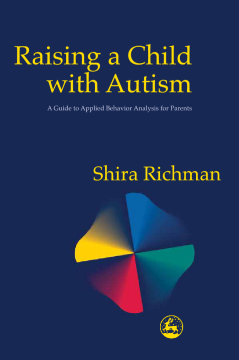
Additional Information
Book Details
Abstract
Applied Behavior Analysis (ABA) is increasingly recognised as a highly effective way of helping children with autistic spectrum disorders. It is based on a variety of methods and techniques which can be used to promote skills for daily living and change difficult behavior. In Raising a Child with Autism, Shira Richman explains how parents can adapt the practical techniques used in ABA for use at home, providing tips and guidelines to increase play skills, improve communication and sibling interaction and increase independence. The book also covers toilet-training, food selectivity, self-dressing and community outings, and includes an overview of the theory behind ABA as well as a list of resources for further reading. It offers parents a practical and effective way to help autistic children interact more successfully with family, friends and at school.
`This highly informative guide teaches parents how to utlize Applied Behavior Analysis (ABA) in order to assist their child's daily living skills and social behaviour. Covering everything from advancing relationships with siblings to increasing their ability to communicate, this book will serve as an effective way to better prepare your child for the world.'
Georgia Family Magazine
`Behaviour therapy consultant Richman clearly outlines the applied behaviour analysis (ABA) activities that parents can use with ASD children. Included is this helpful guidance for toilet training, daily living and increasing communication and sibling interaction. Since ABA consultants may be out of financial or geographical reach of many parents, having a strong resource like this is invaluable.' -Library Journal
`Richman's book is more specifically aimed at Applied behaviour analysis…The reader is invited to learn about ABA, how to structure their child's free time…how to bring a child with autism into the community'
Autism, an International Journal.
`Richman covers a broad range of training skills that will be important to all families struggling to help their child with autism. These range from how to structure a child's free time (a topic that is often not addressed in the intervention literature), teaching daily living skills including toileting and mealtimes behaviours, to communication and social skills. Additionally, advice is offered about problem behaviour and community activities. A section that is rarely found in these types of books addresses how to establish relationships between the child with autism and his or her siblings. Many of the more important concerns of these parents are mentioned and helpful tips are provided. Readers should also appreciate the contemporary nature of the information provided. The author has incorporated more recent advances in teaching skills, such as incidental teaching procedures, that are sometimes missing from such works.'
Behavioural Therapy and Experimental Psychiatry
Shira Richman is a behavior therapy consultant living in New York, who attained her MA in Psychology at New York University. She has worked extensively with children with autistic spectrum disorders, creating and supervising programs in Applied Behavior Analysis. She has been in charge of staff training and evaluation in a number of educational institutions and has also formally instructed parents in Behavioral Theory and Application.
`This is a very practical book which is easy to read. It outlines the theory of Applied Behavioural Analysis and how families can use it with an autistic child to facilitate their child's learning and development of living skills. The author demonstrates, through practical examples, how Applied Behavioural Analysis techniques can be applied to many everyday situations that are experienced by families living with an autistic child. The book is aimed predominately at parents of autistic children, but would be a useful resource for occupational therapists and other professionals working with children.'
`The book concludes with a case study and an extensive list of useful books, resources, contacts and support groups.'
British Journal of Occupational Therapy
